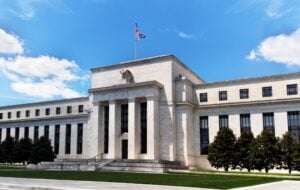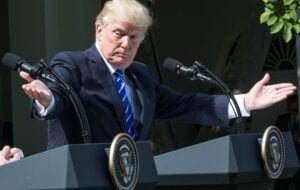
The Federal Reserve has taken extreme actions in response to the coronavirus outbreak and lockdown. In addition to purchasing more than $2 trillion worth of US Treasuries and mortgage-backed securities, the Fed has created a variety of emergency lending programs which were previously only used in times of severe financial crisis.
Among the most controversial of these is the Municipal Liquidity Facility (MLF), which provides funding for state and local governments, a task the Fed has traditionally avoided. Under the MLF, the Fed will provide funds directly to state and local governments in exchange for newly-issued municipal bonds. The Fed has posted a list of eligible borrowers that includes all 50 states, the District of Columbia, and more than 100 US cities and counties, as well as “certain multistate entities.”
The MLF is supported by the Coronavirus Aid, Relief, and Economic Security (CARES) Act, which authorizes the Fed to buy bonds from municipal governments “that do not, in the aggregate, exceed” $500 billion. With only about $16 billion of those funds currently in use, it appears the MLF is just getting started. However, the language “do not […] exceed” indicates that the Fed need not spend the full authorized amount of $500 billion. In fact, some economists have suggested the Fed close down the MLF immediately, before it causes irreparable damage to the perception of Fed independence.
The MLF is bad economic policy. It is also inconsistent with the Fed’s mission. The Fed’s emergency lending authority allows it to provide liquidity to the financial system, but the MLF is not really a liquidity program in the traditional sense. The Fed’s past liquidity programs, such as those used in the 2008 financial crisis, were directed at problems of illiquidity in financial markets. For the few instances in which the Fed lent directly to financial companies, it was reprimanded by Congress, which revised the Federal Reserve Act to disallow such policies in the future.
In the case of the MLF, the Fed will provide financing directly to municipalities. It will not purchase bonds from financial markets. That means the program will have no effect on financial market liquidity. These actions were authorized by Congress in the CARES Act, but just because the program is legal does not mean it is good policy.
Unlike most of the Fed’s other liquidity facilities, the MLF is not intended to protect financial markets or the banking system. The Fed’s emergency lending authority is meant to allow the banking system to function even in times of crisis. Section 13(3) of the Federal Reserve Act, which authorizes the Fed’s emergency lending, requires that such programs be “for the purpose of providing liquidity to the financial system.”
As the Fed describes, however, the MLF is “to help manage cash flow stresses caused by the coronavirus pandemic,” which has nothing to do with protecting the banking system. Such programs should be conducted by the Treasury, not the Fed. Like its loans to small businesses made through the Main Street Lending Program, municipal finance is not the Fed’s job.
Economists have long argued that central banks should be independent in their monetary policy decisions and not subject to the political pressures associated with fiscal policy. Providing funding to municipal governments is a fiscal policy decision. It is not directly related to the Fed’s main goals of managing the money supply and safeguarding the banking system. For this reason, well-functioning central banks avoid involvement in municipal finance and other fiscal policies that might undermine their independence.
Fed officials used to understand this principle. Testifying before Congress in 2011, then-Chairman Ben Bernanke was asked if the Fed would step in to purchase state and local bonds to prevent turmoil and potential defaults in the municipal bond market. Bernanke stated, “We have no expectation or intention to get involved in state and local finance.” He continued: “This is really a political, fiscal issue.”
Janet Yellen made similar remarks as Fed Chair in 2015 Congressional testimony. When asked by Rep. Ed Royce whether the US government should intervene to provide financial assistance to Puerto Rico, Yellen said, “This is not a matter in which I have an opinion. It is something the Federal Reserve can’t and shouldn’t be involved in.” As follow-up, Rep. Royce noted that “[i]n the past, you have said it is best not to have the Federal Reserve step in as a creditor of a State or municipality.” Chair Yellen replied, “And I continue to believe that very strongly.”
Notice the two words emphasized in Yellen’s statement: The Fed can’t be involved because, at the time, it was prohibited from buying municipal bonds. More importantly, it shouldn’t be involved in municipal finance because that is not what well-functioning central banks do. Bernanke and Yellen were right: providing funding to states and municipalities is fiscal policy, and the Fed shouldn’t be involved.
Finally, the MLF opens the door to larger bailouts of state and local governments. Illinois, New Jersey, the city of Chicago, and many other municipalities are in poor fiscal condition, not primarily due to the unexpected pandemic, but from years of excessive spending. Their representatives are already pressuring Congress and the Fed for greater funding assistance. Bernanke and Yellen resisted such pressures by openly stating that the Fed would not be involved with municipal finance or other fiscal policy actions. If a municipal bailout does occur, it should be conducted through Congressional legislation, not by the Fed.
Chairman Powell should follow the advice of his predecessors. With the program still in its infancy and economic recovery already underway, now is the time to end the MLF in order to preserve the Fed’s independence, maintain the separation between fiscal and monetary policy, and deter additional calls for municipal bailouts in the future.
Unfortunately, a Fed bailout of states and municipalities may already be on the way. In his Congressional testimony, Powell was asked if a larger facility could be created to provide financial assistance to state and local governments. He replied that “Those are really longer-term funding needs, but notwithstanding that, we are taking a look.”




